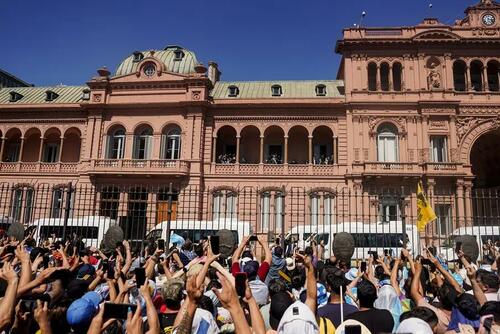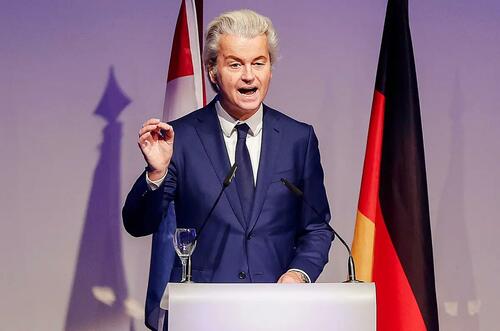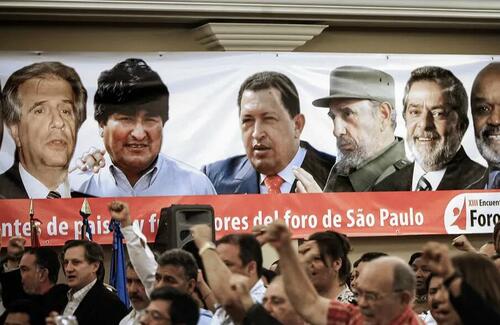Authored by Marcos Schotgues via The Epoch Times (emphasis ours),
Javier Milei’s landmark election as president of Argentina might prove a turning point in the dominance of leftist governments in Latin America. Some are hoping it goes beyond.

“He’s starting a revolution that begins here, is going to go through America, all the way to the north and then on to Europe,” Lilia Lemoine, a newly elected congresswoman in Argentina and long-time Milei ally, told The Epoch Times at President Milei’s inauguration on Dec. 10.
President Milei, a libertarian and self-described “anarcho-capitalist,” has bucked the left-wing grip that, by the beginning of 2023, has held all nations in the Americas except Uruguay, Paraguay, El Salvador, and Ecuador.
“Just like the fall of the Berlin Wall marks the end of a tragic era for this world, this election marks the turning point of our history,” President Milei said in his inaugural address.
Brazilian lawmaker Cristiano Caporezzo called Milei’s election “absolutely historic.”
“It marks a very strategic moment for Latin America, a right-wing ‘reconquering’ of the continent,” Mr. Caporezzo told The Epoch Times.
“Milei’s arrival in Argentina will give the Chilean elections some strength. More countries in Latin-America will start walking towards conservatism.”
Colombian Senator María Fernanda Cabal also attended President Milei’s inauguration in Buenos Aires on Dec. 10.
“He today gave us hope, in Latin America, also in the U.S. and worldwide,” she told The Epoch Times.
“What we see is that Javier Milei has opened the door and all these governments that have been ruling, societies that have been suffering with all these activists that go against the nature of human beings … currently, everything is going to turn right,” Ms. Cabal said.
“We hope that Trump wins. We hope that Jose Antonio Kast in Chile wins, and we hope that we can save Colombia too.”
Ernesto Araújo, former minister of foreign relations of Brazil, now a strategic aid for international affairs at Spain-based think tank Fundación Disenso told The Epoch Times he sees a global shift towards conservatism.

“This can be a true ‘reconquest’ of freedom worldwide, which might be starting here in Argentina. I like to think big, and I think this might indeed be the case,” Mr. Araújo said.
“If [the Milei administration’s proposals] work out, people might realize that the ideas of freedom work. That they work in a big country.“
In his first week in office, President Milei slashed nine government ministries, took steps towards strengthening trade partnerships, and prepared to crack down on protests that may arise from upcoming drastic economic measures.
He has promised to reduce government spending, eliminate Argentina’s Central Bank, and potentially adopt the U.S. dollar as an official currency. During his campaign, he pledged to replace the public education system with a voucher-based alternative, and move the public health care model to an insurance-based system.
“This new social contract [people voted for] offers us a different country, a country in which the State does not direct our lives, but rather safeguards our rights, a country in which people are held accountable for their actions,” President Milei said during his inaugural speech.
Hermann Tertsch, a Spanish member of the European Parliament, celebrated President Milei’s victory at the latter’s inauguration in Buenos Aires on Dec. 10.
“I believe this victory—of the truth—in Argentina is a historical victory, and a victory of enormous repercussions,” said Mr. Tertsch told The Epoch Times.
“It’s so important, and it has implications for all of the Americas, and for all of the West, an extremely important turnaround.”
The recent win in The Netherlands by conservative Geert Wilders, leader of the Party for Freedom, has buoyed conservatives in the region. Mr. Wilders won the election, but must form a majority coalition with other political parties in order to become Prime Minister.

“We can, for the first time in the history of the European Parliament, make right wing politics,” Mr. Terstch said.
“We can stop the monstrosities of the 2030 Agenda, of the green pact, of all their permanent meddling into the livelihood [of people], the liquidation of subsistence that the current European Commission is pushing. This can change. We can change the Commission. And then we’ll see a difference in Europe.”
The 2030 Agenda is the United Nations plan to achieve 17 “sustainable development goals” by the year 2030. The goals include “gender equality,” “responsible consumption and production,” and climate action.
“The green pact” referred to by Mr. Tertsch is the “European Green Deal,” a framework in which European Union countries have committed to achieving “climate neutrality” by 2050.
“We have yielded so much in 50 years, 60 years, that we can yield no more. Now we can only reconquer. And we are in a full reconquest campaign,” Mr. Terstch said.
But conservative and libertarian politics are up against some determined and well-coordinated forces.
“[This] is not just about the economy, this is not just about Argentina’s runaway inflation, it’s not about the fact there’s no growth,” Mr. Araújo said.
“It is also about the matter of narco-trafficking, of organized crime. It is the problem of Latin-American organized crime being connected with worldwide organized crime. It is the problem of the China-Russia-Iran totalitarian bloc.”
Socialist administrations across Latin America, particularly the Venezuelan regime, have facilitated or engaged in international drug trafficking and coordinated with Iran, China, and Russia against United States interests and regional security for years.
In 2020 the U.S. Department of Justice charged Venezuelan dictator Nicolás Maduro and 14 other current and former officials in a “narco-terrorism” conspiracy to “flood” the United States with narcotics.
In February 2023, Irani military ships sanctioned for terrorism docked in Brazil and in June a defense deal between Iran and Bolivia bound the two nations closer together.
Latin American socialist regimes have enabled Iran-backed terrorist groups to operate broadly in South America for years.
The Chinese communist regime has been spreading its influence widely in Latin America for years with trade deals, an expanding military presence, and ties to radical leftists groups in the region.
The São Paulo Forum is the hub for leftist groups and political administrations.

Created in 1990 by Brazil’s President Lula da Silva and Cuban dictator Fidel Castro, it united narco-terrorist communist guerrilla groups such as Colombia’s FARC and political parties often in power, including Mexico’s MORENA and Brazil’s Workers Party.
The group’s stated goal is to move the region further left.
The São Paulo Forum inherited a framework of cooperation among left-wing parties that have been coalescing for more than a century with organizations such as the Third Communist International.
The Heritage Foundation’s Mike Gonzales has called the São Paulo Forum “the world’s largest and most impactful Marxist international organization.”
The group’s leaders often flaunt anti-American rhetoric and either are authoritarian or condone authoritarianism.
The Chinese Communist Party has cooperated increasingly with São Paulo Forum parties, some of which are now in power.
In March 2022, ahead of elections in Brazil and in Colombia, the Chinese Communist Party and the São Paulo Forum held a series of conversations. During a talk, CCP official Sun Yanfeng, affiliated to the China Institute of Contemporary International relations and to the China’s Ministry of State Security, said he rooted for leftist victories in both countries.
Read the rest here…



